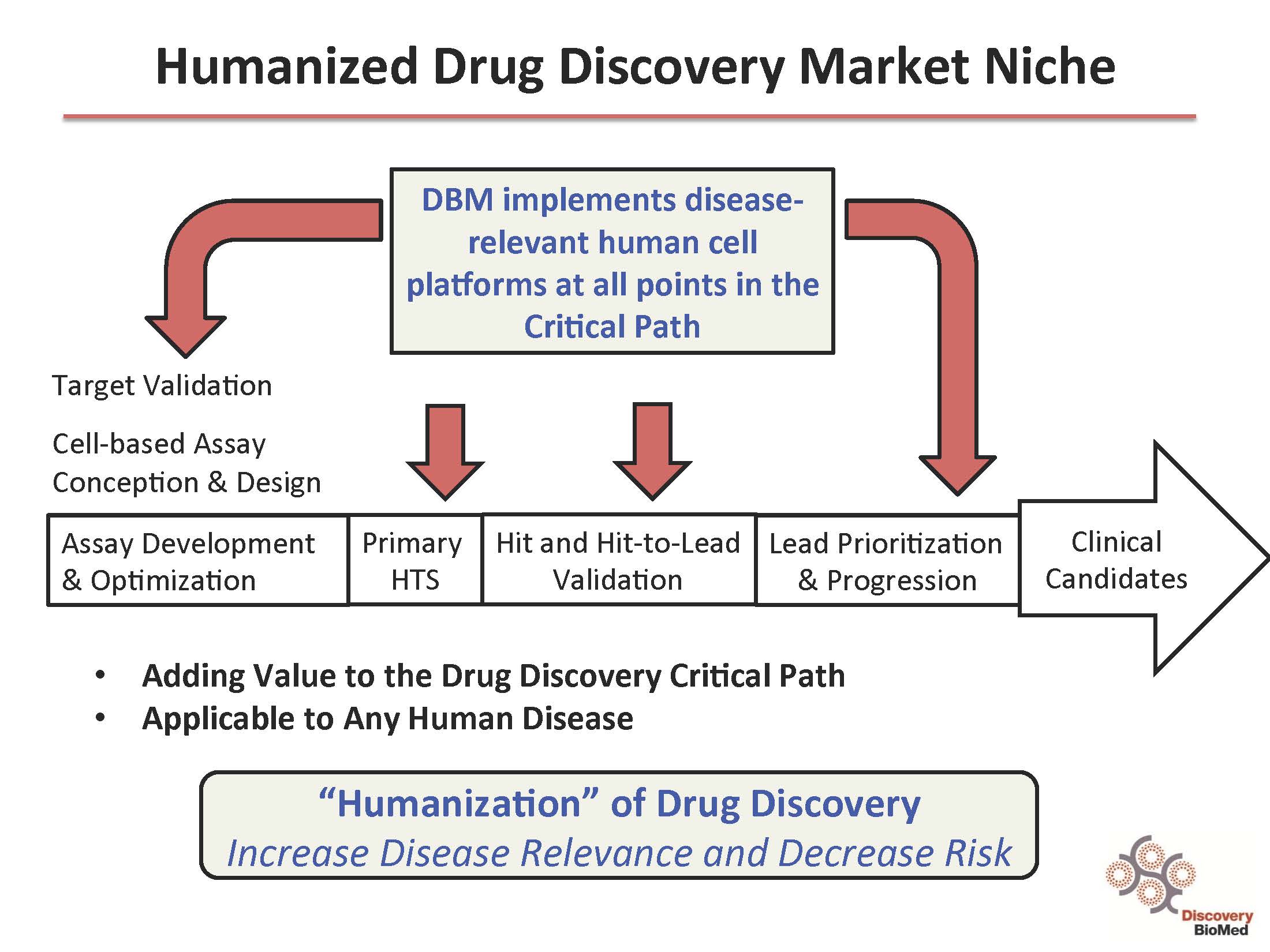It is not unusual for researchers to experience a "light bulb moment”—these are the insights that fuel the scientific discovery process and contribute to the translation of findings into clinical trials that produce new interventions and therapeutics that eventually improve human health.
But for many, the challenge is recognizing when an idea is truly ground breaking and worthy of risk and sacrifice, and then finding the humility, courage, and drive (not to mention venture capital) to follow where such an idea might lead.
 DiscoveryBioMed Inc.'s core philosophy is to use human cells at every stage of the drug discovery critical path.A hearty dash of impatience helps as well, according to Dr. Erik Schwiebert, CEO and Chief Scientific Officer of DiscoveryBioMed, who presented the second in a series of CCTS Forums featuring scientists whose discoveries are changing health care as we know it.
DiscoveryBioMed Inc.'s core philosophy is to use human cells at every stage of the drug discovery critical path.A hearty dash of impatience helps as well, according to Dr. Erik Schwiebert, CEO and Chief Scientific Officer of DiscoveryBioMed, who presented the second in a series of CCTS Forums featuring scientists whose discoveries are changing health care as we know it.
Schwiebert confessed his “ah-ha” moment was preceded by a growing sense of frustration with the slow pace of scientific translation due, in part, to testing drugs intended for humans on non-human cell models. Extrapolation of results from animal models to humans is imprecise and can result in a trial and error cycle that costs time and money. Schwiebert, an expert in human cell physiology and pathophysiology, realized screening molecules on human cell platforms could speed up the drug discovery timeline and reduce risk.
Before he could make the transition from tenured professor to successful life sciences and biotech entrepreneur, however, Schwiebert had much to learn. “Just 10-11 years ago, I was where you are right now, taking courses at Collat School of Business on IPOs, how to start a biotech business, and finding funding,” he told the audience. He formed his company as he learned, establishing DiscoveryBioMed (DBM) in April 2007 while still maintaining his position at UAB. Early funding was “serendipitous,” provided in part by a Birmingham tech fund that would tighten its purse strings after the recession hit.
After negotiating conflict of interest with UAB to secure rights to his insight and leasing lab and office space at Innovation Depot, Schwiebert left UAB in Sept. 2007. “My investors were delighted and put in even more money, seeing my resignation as a sign I was ‘all-in’.” DBM became an LLC in October of 2007, secured even more funding in the form of bridge loans and common equity investments, and became a C corporation as of Jan. 1, 2008. Following the Lean Start-up principles espoused by the National Science Foundation’s I-Corp™ program, Schwiebert bought used furniture and filled key personnel positions before hiring himself.
In the decade since, he has stayed true to his company’s original core philosophy—to use diseased and normal human cells at every stage of the drug discovery critical path—even as his business model has changed and grown to include not only internal drug discovery but custom drug discovery services and partnerships.
To date, DBM has attracted nearly $2 million in seed money, with almost $9 million more in SBIR grants. After breaking even for more than six years, DBM's 2017 revenues are projected to exceed $2 million. The company has produced “high value” clinical candidates for renal/urologic, respiratory, and metabolic diseases.
After concluding his personal journey, Schwiebert shared lessons learned concerning different federal small business grants, including SBIR, STTR, and the commercialization readiness pilot (CRP) program, and viable academic-to-commercial start-up models. He described a compelling model for universities that taps the creativity of ‘less differentiated’ energetic people, aka newly minted PhD trainees, and pairs them with tenured faculty who are unlikely to leave their positions.
In addition to his roles as DBM CEO and Chief Scientific Officer, Schwiebert still finds time to direct and teach “Idea to IPO” and mentor for “Technology Venture Business Planning," both offered by Collat. He encouraged aspiring scientist-entrepreneurs to reach out for help any time. Dr. Molly Wasko, professor and associate dean for Research, Innovation, and Faculty Success at UAB’s Collat School of Business, thanked Dr. Schwiebert and encouraged researchers with a business idea to register for the upcoming I-Corp South Spring Regional Training on Bioinnovation and Commercialization, which kicks off on April 12.
Visit our CCTS Monthly Forum page to access Schwiebert’s slides and watch the video of his presentation.